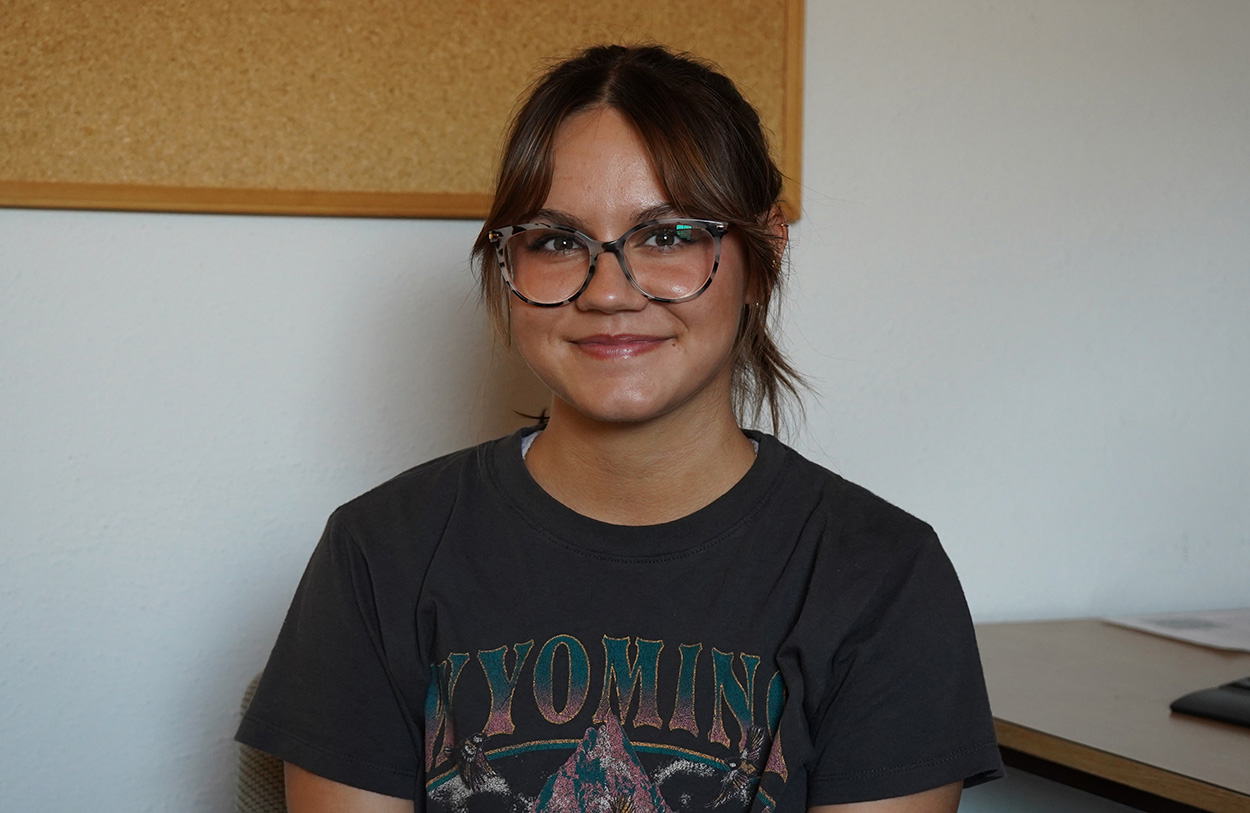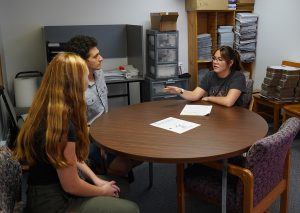
Story and photography by Logan Jackson
Searching for a summer research opportunity, Haley Hultz was hoping to find a program that would allow her to conduct independent research and give her the freedom to explore her passions. She found that perfect mix with the Cherng Summer Scholars program.
A full-time, nine-week, summer research or creative scholarship program for Honors College students, the Cherng Summer Scholars program is supported by a gift from Peggy and Andrew Cherng and the Panda Charitable Foundation. Recipients receive a $7,000 award and access to a $1,000 project expense account.
Hultz, a psychology major, is conducting research through the Personality and Emotion Laboratory headed by Timothy Trull, Curators’ Distinguished Professor and Byler Distinguished Professor of Psychological Sciences.
“Receiving this scholarship was very validating,” said Hultz, who will be a senior this fall. “I knew that I wanted to do research this summer, and I was searching for that perfect program where I could do my own independent work. The Cherng Summer Scholars program really encourages creative thought and unique projects. It’s really a dream program; I get to conduct research in a field that I’m passionate about.”
Hultz, who is from the Lake of the Ozarks area, has been involved in research since she first became a University of Missouri Tiger. Originally a biochemistry major, Hultz got connected with research through the Discovery Fellows program. A scholarship program focused on allowing students to gain insight into the professional world, as well as enhance their knowledge base and critical thinking skills, Hultz was able to get experiential learning experiences immediately.
“I earned the International Baccalaureate diploma in high school and was pretty STEM-oriented within that program,” Hultz said. “When I arrived at Mizzou, I was very much focused on a PhD. Working in a biochemistry laboratory was definitely my goal – and I honestly really enjoyed it and learned so much. I realized, though, that it wasn’t exactly for me.”

Many conversations followed as Hultz looked to find a program that would fit her interests. She talked with professors and graduate students, as well as her family, and did her own independent research on the options available to her. She decided to switch to a psychology degree during her second semester.
“I knew I was good at biochemistry and would have been fine if I stayed, but I also realized that I wasn’t in quite the right place,” Hultz said. “That was tough to admit to myself, but it was one of the best decisions I have ever made. I knew that just because I could do something didn’t mean I had to do it.”
Hultz, who is also minoring in chemistry and sociology, said that her desire to study human behavior made the program an easy choice. She was also excited to see that there were numerous research opportunities within the field.
“As I was looking at the potential career outcomes, I was surprised to see so many options,” Hultz said. “I was also excited to see all the research opportunities. I wasn’t sure what that work entailed, but I’ve seen so many similar STEM applications, which is what I love about it.”
Hultz is specifically interested in industrial and organizational (I/O) psychology, which is the scientific study of human behavior in the workplace. Some of variables of her research this summer are related to I/O psychology.
“Industrial and organizational psychology is a smaller field, and while we don’t have anything directly related to it here, I’ve been able to craft my work to hit on some of those themes,” Hultz said.
Hultz is part of a research study, funded by a grant from the National Institute on Alcohol Abuse and Alcoholism (NIAAA), focused on young adult drinking behavior. The lab is currently conducting ecological momentary assessments (EMAs), which study people’s thoughts and behaviors in their daily lives by collecting a variety of data. Along with those assessments, they are doing phone surveys to gather even more information. Hultz said the focus is on young adults because binge drinking is typically highest among those populations.
“We’re collecting a lot of information and each student in our lab has the opportunity to choose the variables they want to analyze,” Hultz said. “Essentially, each of us will have a different project.”
Hultz is specifically looking at the relationship between employment status, personality, binge drinking and alcohol-related consequences. She is conducting quite a bit of statistical analysis on the data she is receiving.
“The thought of applying research to human behavior is incredible, and that’s what makes psych research so neat,” Hultz said. “It’s been very intriguing to apply my research to real-world situations.”
Hultz said that the Cherng Summer Scholars program has allowed her to showcase the importance of this type of research, too. Part of the program includes a weekly meeting between all recipients where they share ideas and project procedures.
“I think a lot of times when we think about research, we think about white lab coats and test tubes,” Hultz said. “There are all types of research, and it’s all important and interesting. I hope through my work I can help open people’s eyes to how much variety there truly is. That’s why I love being a Cherng Summer Scholar – I get to hear about all these cool projects other students are doing.
“Mizzou’s undergraduate research opportunities really are unmatched. There are so many opportunities to get these outstanding experiences; it’s pretty incredible. It’s been really fun to share my research with my peers and learn more about where their interests are.”